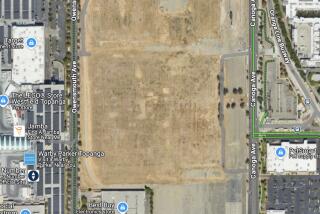Air Force May Barge Rocket Fuel to Vandenberg Base
- Share via
WASHINGTON — In an effort to reduce a potential public health threat, the Air Force is exploring the prospect of shipping highly toxic rocket fuel by barge through the Panama Canal to Vandenberg Air Force Base rather than trucking it across the United States.
Using barges to deliver the volatile chemicals contained in rocket fuel would be without precedent, the Air Force said.
An 18-month study of the merits of transporting rocket fuel components by waterways or rail to Vandenberg near Lompoc was completed last month and is under review by the Air Force. But its contents will not be made public until a decision is made by the Pentagon, officials said.
The issue sparked a furor in late 1987 when it was revealed that rocket fuel components were being shipped by truck on the Ventura Freeway through the densely populated San Fernando Valley.
The chemicals include nitrogen tetroxide, which can be fatal if inhaled.
Protests by elected officials over trucking nitrogen tetroxide through the San Gabriel Valley, across Pasadena, Glendale and Burbank, then through the San Fernando Valley and into Ventura County prompted the Air Force to redirect the shipments. A northern route through less-populated Barstow, Mojave, Gorman, Mariposa and Santa Maria was selected.
During congressional hearings at that time, Rep. Robert J. Lagomarsino (R-Ventura) asked then-Air Force Secretary Edward C. Aldridge to undertake a study of the feasibility of transporting the fuel by barge. Lagomarsino’s 19th District includes Vandenberg and surrounding Santa Barbara County communities.
“At sea, there’s obviously some danger, but nothing like there is on a road or a railroad,” Lagomarsino said last week. Transporting the fuel via water would therefore mean the least possible exposure to the smallest number of people, he said.
Even with the new truck route, Lagomarsino said, a spill could jeopardize nearby residents, albeit fewer of them. Santa Maria, for example, is a city of 52,000. In addition, the fuel is hauled 2,136 miles from Vicksburg, Miss., where it is manufactured, across six states to Vandenberg, where it is used to launch military rockets.
The nitrogen tetroxide currently is transported in 3,057-gallon tank trucks under contract with the Air Force. The contractor makes as many as two rocket fuel shipments a month, or as few as one every two to three months, depending on Vandenberg’s launch schedule.
The transportation study, conducted by Schneider Engineering of Harrisburg, Pa., is being reviewed by the San Antonio Air Logistics Center at Kelly Air Force Base in San Antonio, which oversees the shipment of rocket fuel nationwide.
Center officials are expected to make a recommendation to the Air Force, which will then seek comment from various state agencies in California, including the California Highway Patrol, before making a final decision.
The study includes an assessment of the alternative costs of shipping by truck, rail or barge. Center spokeswoman Phoebe Brown said she could not disclose cost data or any other information from the draft report.
Under the ocean transport proposal, the barges would depart from Vicksburg, move down the Mississippi River through Louisiana to the Gulf of Mexico, travel south through the Panama Canal, then northwest in the Pacific past Mexico and the Baja up to Vandenberg.
The cargoes would be unloaded at a barge dock that was built on the base for the space shuttle but has never been used.
Municipal officials have voiced concern about being able to evacuate motorists and nearby residents from the toxic gas cloud that could be unleashed by an accidental leak of the fuel on a freeway. Federal officials have said that they carefully monitor nitrogen tetroxide shipments.
“There have been no accidents or incidents involving the release of product since the shipments began in the mid-1960s,” Brown said.
In addition to the Vandenberg deliveries, smaller amounts of rocket fuel are carried by shipping companies to aerospace and defense contractors throughout Los Angeles.
Under a 1987 agreement between the Air Force and Los Angeles Mayor Tom Bradley, the CHP and the city police and fire departments, shipping companies are to provide Los Angeles police and fire officials four hours’ notice when rocket fuels are shipped to aerospace and defense contractors in the city.
The Department of Defense also agreed to limit those shipments to between 7 and 10 p.m.
More to Read
Sign up for Essential California
The most important California stories and recommendations in your inbox every morning.
You may occasionally receive promotional content from the Los Angeles Times.













